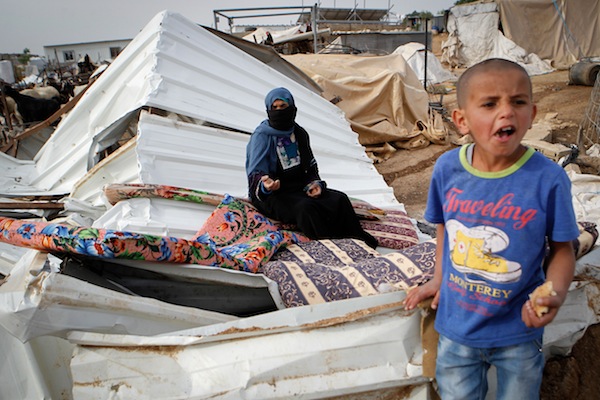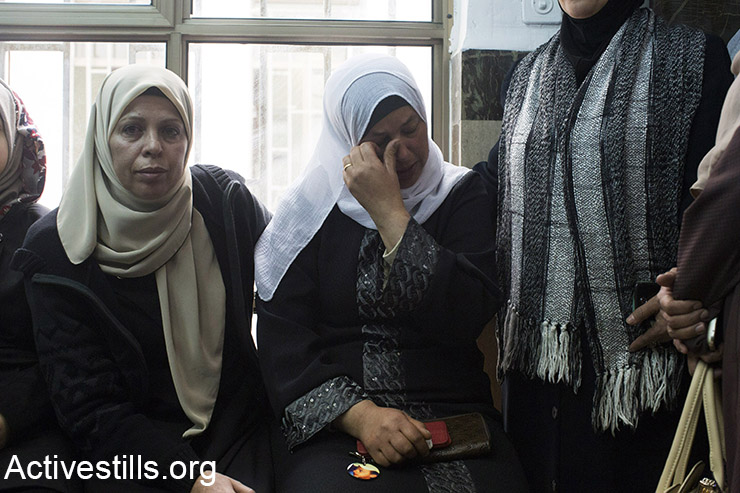If the Israeli security establishment is looking for a proper way to put an end to violence, a little equality in the eyes of the law might go a long way.
By Talal Jabari

One of my very first assignments as a young journalist was to go to Shuafat Refugee Camp in East Jerusalem to take pictures and gather quotes pertaining to the demolition of several homes that day. I remember looking on as the bulldozers went about their work, and as the residents of the homes, male and female, wept helplessly as they watched their life’s savings collapse into neat piles of rubble.
The demolished homes didn’t belong to so-called terrorists; the residents were accused of building without permits, which is a topic for another article. But suffice to say, it felt like a painful event for the recipients of the demolition orders.
The fact is that since 1967, according to the Israeli Committee Against House Demolitions (ICAHD), the Israeli government has destroyed on average about 1,000 Palestinian “structures” a year. That’s a little under three structures a day.
For full disclosure, a “structure” could mean anything from a chicken coop to a nine-story apartment building.
Of the more than 48,000 structures Israel demolished since 1967, hundreds were destroyed as a punitive measure, in the aftermath of a Palestinian attack — even a failed attack. Logic would suggest that the very fact that Israel has had to demolish hundreds of homes rather than a few dozen means the tactic has not been a very effective deterrent. An Israeli army commission came to the same conclusion in 2005, publishing a report that put an end to the practice of punitive demolitions.
To clarify, until 2005 the Israeli government destroyed hundreds of Palestinian homes that belonged to suspected perpetrators or planners of attacks or their families. In the vast majority of those cases, those suspects had ceased to live in those homes — they were either dead, incarcerated, or on the run. The result of such a punitive demolition is that the people who are actually penalized are the suspect’s families who most of the time, by the Israeli military’s own admission, had nothing to do with the actions that prompted the destruction of their homes.
So why are we still discussing a practice that was halted in 2005? In it’s infinite wisdom, the Israeli security establishment decided to ignore the findings of two military committees and the research of top Israeli journalists, and nearly a decade later, in the summer of 2014, decided to reinstate punitive house demolitions, with a vengeance. A total of 29 homes were destroyed by Israeli punitive demolitions between October 2015 and January 2016, according to Israeli human rights group B’Tselem.
The summer of 2014, you may recall, was the summer in which three Israelis were kidnapped and killed in the southern West Bank. Israel labeled the perpetrators terrorists, killed them, and demolished their families’ homes. That same summer, three other individuals whom Israel labeled as terrorists kidnapped and bludgeoned a teenager before dousing him with gasoline and setting burning him alive. The perpetrators were arrested, tried, convicted and sentenced, and yet their families continue to enjoy the comfort of their homes.

And when the victim, Mohammed Abu Khdeir’s family petitioned the court to have the homes of the three terrorists destroyed, the Israeli security establishment’s answer was: “Given the scale of the phenomenon of seriously hostile crimes in the Jewish community, the need to implement this [deterrent] does not arise.”
Would the demolition of Abu Khdeir’s killers’ homes have prevented the murders of the Dawabsheh family, who were also burned alive a year later? Maybe; maybe not. But the fact remains that home demolitions are yet another symptom of a justice system that is completely biased against Palestinians, and which implements different and far harsher penalties on Arabs than on Jews.
If you won’t take my word for it, perhaps you will consider a recent experiment conducted by Israel’s Channel 10 television news, which asked both an Arab and a Jewish citizen to publish posts on Facebook calling for revenge killings. Within just a few hours, the Jewish Israeli’s post received over 1,000 likes and more than 30 shares, while the Palestinian’s post only received seven likes. The Palestinian found himself in a police interrogation room; the Jew received messages of support.
If the Israeli security establishment is looking for a proper deterrent, a little equality in the eyes of the law might go a long way. After all, it could keep a lot of innocent people from unnecessarily becoming homeless.
Talal Jabari is a Palestinian award-winning documentary filmmaker and journalist from East Jerusalem. He tweets from @TalalJabari.

